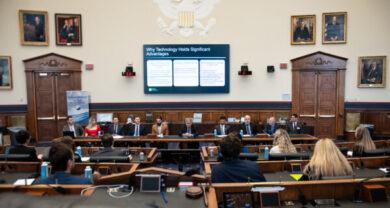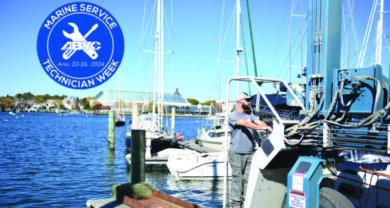NMMA GR outlines its biggest issues
WASHINGTON – The National Marine Manufacturers Association is focusing on 11 legislative issues during this year’s American Boating Congress, which kicked off yesterday at the L’Enfant Plaza Hotel in Washington, DC.
The issue NMMA members are most concerned about is not on the list, though it’s on NMMA’s radar screen. It’s the potential removal of the second home mortgage interest deduction, according to a member poll cited by Monita Fontaine, NMMA vice president of government relations. This afternoon, NMMA is putting on a two-hour session during which this issue will be discussed. It didn’t make the list because it is simply a recommendation made to the president, not a piece of legislation … yet.
The following 11 issues were outlined by Fontaine and her staff during a presentation yesterday:
The Fire Protection Improvement and Correction Act, H.R. 3255 Introduced by Congresswoman Candice Miller (R-MI), the Fire Protection Improvement and Correction Act would direct the Occupational Safety and Health Administration to update its Fire Safety Regulation to reflect the current National Fire Protection Association standards for composite manufacturing operations. OSHA has acknowledged that these standards need to be reviewed and updated, but to date has refused to do so, citing a lack of resources and other priorities, according to NMMA. The current, outdated fire safety standards place an undue burden on the recreational marine industry, said the association. These standards, which have not reflected fire safety technologies developed over the last three decades, cost boat manufacturers substantial time and money. Passage of H.R. 3255 is necessary to compel OSHA to update these regulations, the association stated.
Business Activity Tax Simplification Act (BATSA), H.R. 1956 In the last two years, many states and localities looking to expand their taxing jurisdiction have made bogus claims that out-of-state business have established “economic nexus” in their area and demanded that the companies pay millions in back-taxes, interest and fines even though the businesses receive no appreciable benefits from the taxing jurisdiction, according to NMMA. The complexity and cost of understanding and complying with these inconsistent and vague nexus rules is detrimental to interstate commerce and hurts marine manufacturers, many of whom do business across state lines, the association said. BATSA, introduced by Congressmen Rick Boucher (D-VA) and Bob Goodlatte (R-VA), would establish a “bricks and mortar” physical presence definition that would prevent state and local taxing officials from imposing unfair franchise and license taxes. This legislation, currently awaiting action by the House Judiciary Committee, is needed to bolster business expansion and the international competitiveness of U.S. companies, said NMMA.
Vessel Hull Design Protection Act Amendments of 2005, S. 1785 Introduced by Senators Pat Leahy (D-VT) and John Cornyn (R-TX), S. 1785 was passed unanimously in the Senate and currently awaits action in the House Judiciary Committee. The Vessel Hull Design Protection Act Amendments of 2005 would make technical corrections to the Vessel Hull Design Protection Act, passed in 1998, to make it clear that the Act protects hulls and decks separately. House passage of S. 1785 is necessary to prevent infringers from copying a hull but making small changes to the deck that negate legitimate infringement claims, according to NMMA.
Recreational Marine Employment Act (RMEA), H.R. 940 and S. 902 Introduced in the House by Congressman Ric Keller (R-FL) and in the Senate by Senator Mel Martinez (R-FL), RMEA would remove the recreational boating industry from the onerous, duplicative and expensive requirements of federal longshore insurance, said NMMA. Congress created the Longshore and Harbor Workers’ Compensation Act (LHWCA) to provide a mechanism for compensating injured longshore and harbor workers involved with the commercial marine industry. In 1984, Congress amended the Longshore Act to exempt work done on boats under 65 feet in length in an effort to distinguish between the recreational and commercial marine industries however this arbitrary standard has had the unintended consequence of re-imposing the Act on our industry as a result of the growth in consumer preferences for boats longer than 65 feet, stated NMMA. Recreational marine businesses already covered by state workers’ compensation plans lose millions each year by carrying duplicative Longshore insurance, the association said.
Marine Mammal Protection Act Amendments of 2005, H.R. 4075 Introduced by Richard Pombo (R-CA), H.R. 4075 would reauthorize the Marine Mammal Protection Act. MMPA was reauthorized and amended by Congress in 1994, and its authorization for appropriations expired on September 30, 1999. The 1994 amendments indefinitely authorized the incidental taking of marine mammals during commercial fishing operations and provided for assessment of marine mammal stocks in U.S. waters. They also provided for the development and implementation of take reduction plans for stocks that may be reduced or are being maintained below their optimum sustainable population levels due to interactions with commercial fisheries. H.R. 4075 is a clean bill without controversial amendments that have doomed past efforts at reauthorization, according to NMMA, which urges Congress to pass H.R. 4075 to continue the protection of marine mammals and, simultaneously, ensure the continued enjoyment of the nation’s natural resources by the recreational boating community.
Statute of Repose In August 1971, Congress passed the Federal Boat Safety Act, which authorizes the United States Coast Guard to establish construction and performance standards for manufacturers of recreational boats. The Coast Guard regulations make it clear that like all durable goods, recreational boats are built for many years of enjoyable and safe use, but not indefinitely. Unfortunately, there is increasing incidence of unscrupulous boat owners filing frivolous lawsuits over mundane problems on boats that have been in service for over 25 years, according to NMMA. Even more problematic, some of the suits are being brought over defects of products replaced by the boat owner years after the date of original purchase or, worse, for boats that should be legitimately labeled as salvage, the association said. NMMA expects legislation will be introduced today that would create a recreational marine industry statute of repose to protect manufacturers from unreasonable product liability costs and lawsuits brought many years after the completion and successful operation of a product, it said.
The Magnuson Stevens Fishery Conservation and Management Act S.2012 and H.R. 5018 Magnuson, the premier law governing the management of fishery resources in U.S. federal waters, is up for reauthorization. Combined, the recreational boating and saltwater angling industries contribute some $60 billion and nearly 800,000 jobs to our nation’s economy each year. Approximately 60 percent of powerboats are purchased by fisherman, according to NMMA. The marine industry believes Magnuson can be improved during reauthorization by mandating the use of sound science and equitable process for the designation of marine protected areas, improving recreation fisheries data to enhance management, ensuring full participation and equal consider of the recreational fishing community on fishery management councils, and maintaining recreational boating access while protecting the environment, said NMMA.
Tax Incentives for Boating Safety Equipment NMMA expects legislation will soon be introduced that would provide boat manufacturers a tax incentive to supply new boats with the most up-to-date lifejackets and emergency position indicating radio beacons (EPIRBs), which are small radio transmitters that search aircraft can use to quickly locate people and boats needing rescue. Manufacturers would be permitted to deduct the greater of the fair market value or twice the cost of life jackets and EPIRBs in exchange for providing the equipment free of charge to purchasers of new boats, the association said.
The Protection of Homes, Small Businesses and Private Property Act S. 1313 Introduced by Senator John Cornyn (R-TX), the Protection of Homes, Small Businesses and Private Property Act would prevent unreasonable government seizure of private property, according to NMMA. The power of eminent domain is laid out in the Fifth Amendment, which states that government may take private property for “public use” upon payment of its fair market value. On June 23, 2005, the U.S. Supreme Court ruled in Kelo v. City of New London, that government may seize the home, small business, or other private property of one owner, and transfer it to another private owner or business, simply by concluding that such a transfer would benefit the community through increased economic development. The Protection of Homes, Small Businesses, and Private Property Act would ensure that eminent domain be exercised only for true public uses, not private enterprise, said NMMA.
The Marine Debris, Research, Prevention and Reduction Act, S. 362 Introduced by Senator Daniel Inouye (D-HI) and passed by unanimous consent in the Senate, the Marine Debris, Research, Prevention and Reduction Act currently awaits action in the House Resources Committee. The bill would establish programs within the
National Oceanic and Atmospheric Administration to help identify, assess, reduce, and prevent marine debris and its adverse impacts on the marine environment, navigation safety and coastal communities. Millions of marine mammals, seabirds and sea turtles are injured or killed each year as a result of becoming entangled in debris or ingesting plastics, which they have mistaken for food, according to NMMA. Marine debris also causes costly repairs to marine engines and safety concerns for water enthusiasts.
Atlantic Intracoastal Waterway Funding The Atlantic Intracoastal Waterway (AIWW) connects Virginia to Florida, providing a navigable waterway that is vital to our nation’s infrastructure, said NMMA. The AIWW is used by many recreational boaters along with various commercial entities. Congress originally authorized the AIWW to be maintained at a depth of 12 feet. Today, however, the controlling depth in the Waterway is often just 8-9 feet and, in some portions, as shallow as 5 feet, according to the association. The situation has reached beyond the crisis point and yet President Bush’s FY06 budget eliminates all funding for the AIWW, stated NMMA. As a result, more sections of the waterway will quickly become unusable and will be forced to close. Experts estimate that the U.S. Army Corps of Engineers will need $38 billion to restore the AIWW. NMMA urges Congress to provide the funds necessary to keep the AIWW open.
In addition to these items, David Dickerson identified three main issues NMMA is confronting on the state front: manufacturer-dealer contracts, lemon laws and boating restrictions.
Dickerson was pleased to share expectations that many NMMA members would adopt recommendations from the model manufacturer-dealer contract it helped create last year. He also said the Grow Boating campaign was taking the steam out of a push toward state lemon laws. Finally, he noted that crowding, speed, noise and reckless boat operation have reached the ears of state legislators, as made evident by bills passed in Alabama and Georgia.
- For more of the latest news, click here.




